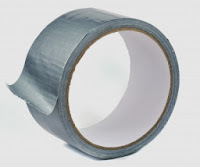There are two things that I gather up when I bring in the regional
weekend paper from my driveway: my cup
of coffee and a roll of duct tape.
Included in that special edition paper is a national column called “Living
With Children,” written by a certain family psychologist who often times spouts
nonsense that makes my head explode; hence my need for the duct tape.
In his latest column, this psychologist tells parents that
they should not be wasting their time to get their children to cooperate, but
instead, should be delivering direct orders.
He compares this necessary action like an ‘army officer would give
direct orders to a private’ (his words, not mine). But many parents like you and I have realized
that autocratic parenting went out generations ago. Though some families still subscribe to this
style of parenting, many have realized that it doesn’t work anymore.
What this psychologist suggests is that parents must control
their children and issue orders whenever they want a task completed. What I suggest is to evaluate the advice you’re
getting before believing it or following it.
Possessing the title of ‘psychologist’ does not guarantee that you’re
getting sound advice.
In his timeless book, Children The Challenge (1964;
Hawthorn/Dutton Press), child psychiatrist Rudolf Dreikurs, M.D. warned parents
that controlling your children will not work and in fact, it will
backfire. In his work, he educated his
readers and followers with the information that children 18 months and up
desire to belong to the family or classroom unit. They want to play a role in a way that helps
them feel like they have a say and can contribute to the group productively.
The columnist I referred to above calls getting your kids to
cooperate, toxic theory. He dismisses
cooperation and instead, wants us to demand our children to obey, and advises
against getting to a child’s eye level to communicate with them. At the close of his article he makes the statement;
“the more obedient the child, the happier the child.” To him I say, “Children don’t want to be
obedient, they want to belong.”
To start getting your children to cooperate, teach them what
cooperation means. Have them help you
make two lists; one that identifies all the things you will always do for them,
regardless of their behavior (healthy food, a place to sleep, warm clothes, health
care, etc.) and another list that outlines the things that we call privileges
(video games, trendy clothes, toys, TV time, etc.). This exercise is important because it is very
difficult for children to see the difference between the two.
You may even want to have them help you make a third list,
identifying all the things that you need frequently from them in the form of
specific things they can help you with.
Then, each time you need your children’s cooperation, avoid commands and
demands, and instead, begin your request with, “I need your cooperation.” Doing the suggested exercise above gives them
new meaning to the word cooperation.
Also give them plenty of examples to see adults cooperating and most
importantly, thank your child when she does cooperative successfully. They love hearing the confirmation that they
contributed and cooperated willingly.
For more help on teaching cooperation, so to my website for FREE
articles and videos.




Comments
Post a Comment